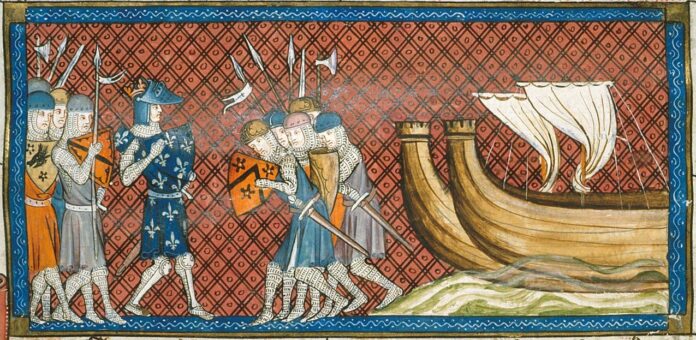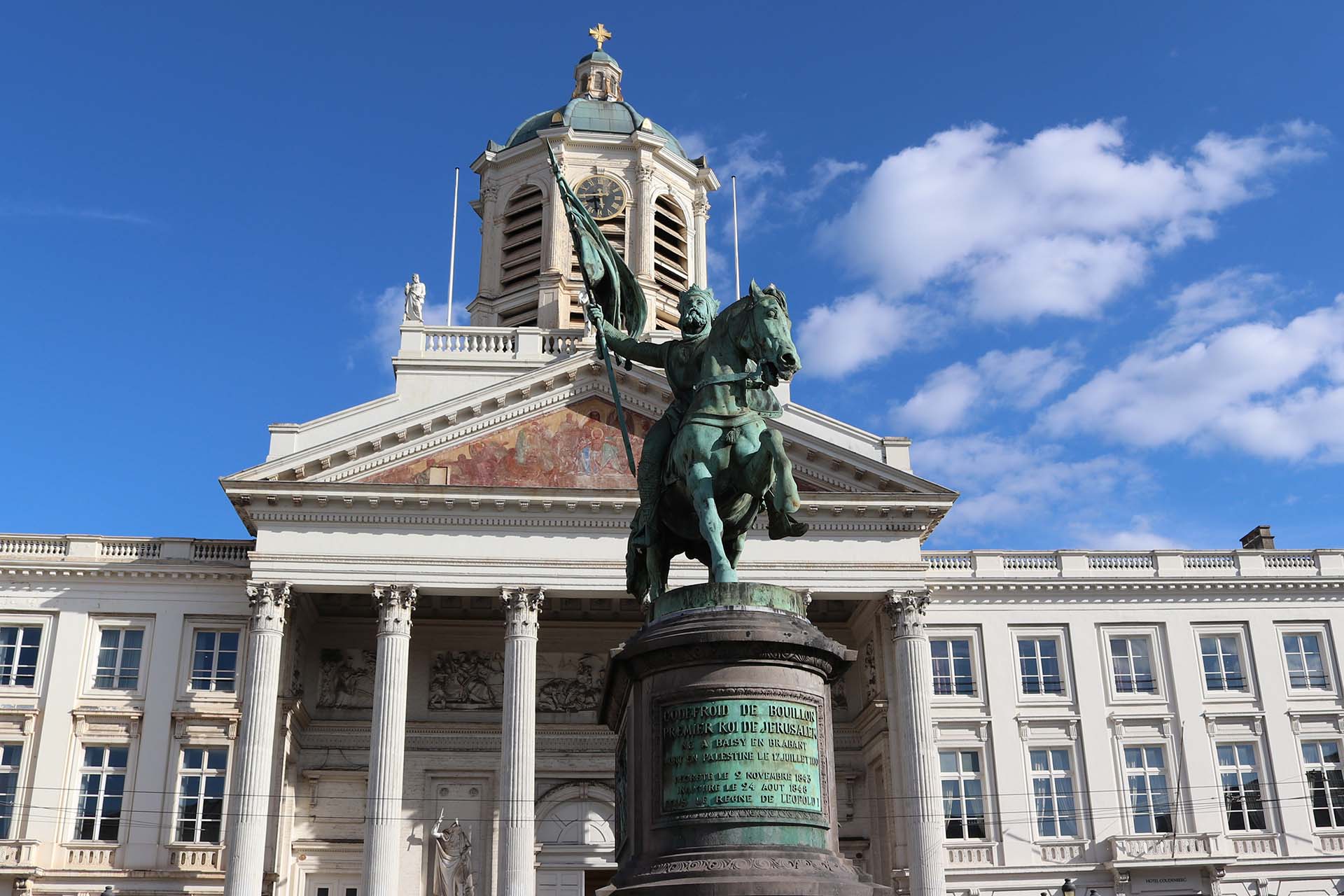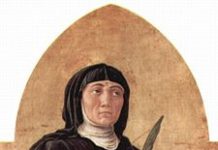
From the time of Muhammad on, Islam has conquered lands by force of arms. The great warrior Charles Martel stopped the Muslim invasion of France in the 8th century. His grandson, Charlemagne, having gained his own reputation as a fighter, was able to hold off invasions of Muslims from the south and Vikings from the north. On Christmas Day in the year 800, amidst great pomp and ceremony, Pope Leo III placed the imperial crown upon Charlemagne’s head, thus restoring the ancient Roman Empire to the greatness it had lost during the Dark Ages. From this time on the popes and princes of Europe would make and unmake each other. But the Bishops of Rome still could not exercise their authority over the Patriarchs of Constantinople. So far as the Empire in the East was concerned, Constantinople continued to view itself as independent politically, militarily, and religiously.
Then came the Crusades
By the year 1095 the Eastern Empire was in serious decline. Fully half its territory had been recently conquered by Muslim forces. Ever since the seventh century the Muslims had occupied Jerusalem, once a Christian stronghold. Islam was again ready to expand and began to move westward with the Turks advancing upon Constantinople. The Eastern Emperor, Alexios I Komnenos, petitioned Rome for western soldiers to assist him in turning back the invaders.
Pope Urban II, doubtless remembering the previous Muslim attempt to conquer Europe during the papacy of Gregory III, answered the call for help by formally instituting the First Crusade. This was the perfect opportunity, since the great theological Schism of 1054, for Rome to reassert both political muscle and papal influence over the Eastern Empire. Pope Urban must have considered too the fact that the European nobility, having no one else to fight, were continually at each other’s throats. The time had come for the Pope to unite all Christendom, West and East, under one flag with a common enemy to confront … Islam.
For the purpose of recruiting an army, the Council of Clermont passionately addressed nobles and clergy regarding the recent atrocities committed against the Eastern Christians. The success of his plea exceeded all expectations. Not only soldiers but peasants volunteered by the thousands. Subsequently great armies of crusaders were enlisted from France, Flanders, Germany, and southern Italy. For the most part these crusaders volunteered from lofty motives. Many of them surrendered their wealth or mortgaged their estates for the long treks away from home, and were certainly risking their lives as well as their fortunes.
There were, of course, tragic mistakes and unintended consequences along the way. The Jews became identified with Muslims as foreigners, and thus many were victimized as the heated rhetoric against foreigners became fierce. When the main armies arrived in Constantinople, the soldiers numbered approximately 35,000. Expecting the Eastern Emperor Alexios to be participating in the crusade, they were surprised to discover that he would remain in Constantinople. Moreover, he required of them that they swear an oath to return any secured lands that were formerly part of the Empire, after which he furnished them provisions and sent them on their way.
After a long and bloody battle, the Crusaders’ first conquest was the old Byzantine city of Nicaea, which was immediately claimed and siezed by the Byzantine soldiers rather than the Crusaders. From Nicaea the Crusaders began the long journey to Jerusalem. Along the way they suffered terrible losses of men, horses, and food (resorting even to cannibalism) and waited in vain for a Byzantine army to join them. After protracted battle and substantial losses, they took the great city of Antioch.

The siege of Jerusalem began in 1099, with only 12,000 of the original 35,000 on the march. After several failed assaults, the city surrendered to the Crusaders. A slaughter of epic proportions followed, with few Jews and Muslims making their escape. The Eastern Christian occupants of the city had escaped or were expelled before the siege. Detailed reports of the massacre survived, but it’s unclear how truthful or exaggerated they were. Godfrey of Bouillon was made titular “king” of Jerusalem. Within a month most of the crusaders, wounded, exhausted, disheartened, were on their way home. Only several hundred knights remained with Godfrey, who died within a year. His brother, Baldwin of Edessa, became the first official King of Jerusalem. This was certainly the most important and successful of the Crusades in the East.
But a major consequence of the First and later Crusades is that tensions increased between the Western and Eastern Empires. Constantinople had not expected so many Crusaders passing through their city on the way to Jerusalem. The Crusaders had not expected such weak-kneed support from Constantinople when its emperor was the one who had pleaded for help. By 1143 the so–called “barbarian” Crusaders from the West had sacked the city of Constantinople, the final and greatest insult the East could have received from the West. But a greater insult was yet to come from the Muslim Ottoman ruler Mehmed II in 1453. Leading massive armies and a huge armada, the 22 year old conquerer laid seige to Constantinople and brought an official end to Byzantium. What was Christian Constantinople would become what it still is, Muslim Istanbul.
Were the Crusades just wars, whether or not they were holy?
According to Thomas Aquinas, three conditions are necessary for a just war. “First, the authority of the sovereign by whose command the war is to be waged. For it is not the business of a private individual to declare war. Secondly, a just cause is required, namely that those who are attacked, should be attacked because they deserve it on account of some fault. Wherefore Augustine says: ‘A just war is wont to be described as one that avenges wrongs, when a nation or state has to be punished, for refusing to make amends for the wrongs inflicted by its subjects, or to restore what it has seized unjustly.’ Thirdly, it is necessary that the belligerents should have a rightful intention, so that they intend the advancement of good, or the avoidance of evil. Hence Augustine says: ‘The passion for inflicting harm, the cruel thirst for vengeance, an unpacific and relentless spirit, the fever of revolt, the lust of power, and such like things, all these are rightly condemned in war.’” (Thomas Aquinas, Summa Theologica, Part II, Question 40)
The motives for the Crusades are many, some noted above. Not least of them was the Muslim capture of Jerusalem a century earlier and the systematic destruction by the Turks of the Church of the Holy Sepulcher along with 30,000 other churches. The Arab conquest of Catholic Spain centuries earlier helped to spark yet another longstanding grievance that needed to be satisfied along with the latest Byzantine fear of invasion by the Turks. These festering and unattended wounds had finally produced a fever of desire for justice, fulfilling Augustine’s view that “a nation or state has to be punished, for refusing to make amends for the wrongs inflicted by its subjects, or to restore what it has seized unjustly.”
When Augustine said “The passion for inflicting harm, the cruel thirst for vengeance, an unpacific and relentless spirit, the fever of revolt, the lust of power, and such like things, all these are rightly condemned in war,” he may as well have been talking about some of the atrocities committed by the Crusaders, especially the annihilation of much of the non-Christian population of Jerusalem after it had already been seized by the crusaders. Then again, as historian John Vidmar, OP suggests, Augustine might have been speaking of the American siege of Baghdad following the Muslim terrorists’ destruction of the World Trade Towers, or the dropping of atomic bombs on Hiroshima and Nagasaki. These too were at the very least a “cruel thirst for vengeance.” No matter how just a war may be declared by those who want to believe their war is just, a great deal of sinning is going to happen on both sides.
There is no way we can know for a certainty that the Crusades saved Europe from the militant advance of Islam. We can be confident it halted that advance for a time. If it had not been for the fact that Muslims were often as much at war with each other as they were with Christians, the westward push of Islam through Europe might have been complete, brutish, and final. But as it turned out, in the centuries to come Europe followed a faster path to modern technology and weaponry than did the nations of Islam. The Crusades surely gave Europe the much-needed time to achieve advances in science and technology that, sooner or later, would leave the Arab warriors still on their camels pounding sand. But a hundred years ago Hillaire Belloc warned that the threat of Islam could return with a vengeance, foresight that has proven some worth in more recent decades.
The modern Crusades
Ironically, the Crusaders in the 12th century brought back with them, among the spoils of war, the very books of learning (Aristotle especially) that the West had forgotten existed. Aristotle’s scientific works, newly translated from Arabic into Latin, spurred an interest in the physical sciences. Those sciences exploded over the next eight centuries, to the point that during the Second World War the physicist Albert Einstein wrote a letter urging President Roosevelt to develop a mighty new weapon, more potent than any ever known, based on atomic physics. Soon after, an awesome new science would be born, a murderous science of mushroom clouds able to cover not only East and West, but the entire world. It is impossible to understand how any just war theory could justify such a universal holocaust.
The 20th century holy war that startled the world was inspired not by a Catholic Pope, but by a Muslim religious leader, the Ayatollah Khomeini. In 1979 he seized power in Iran, accounted himself Supreme Leader, and declared a religious war against Israel and the United States, which he identified respectively as little Satan and great Satan. The favorite catch phrases of his regime were “Death to America” and “Death to Israel,” hardly the sign of holy intelligence at work. Subsequently, Iran secretly commenced its program to develop nuclear weapons.
Fast forward through five decades when Iran, through its proxies Hamas and Hezbollah, waged persistent military campaigns against Israel culminating in the Hamas October 7, 2023 attack on Jewish civilians, killing 1,200 with many more injured and many taken hostage. Meanwhile, international fears began to multiply that Iran was at the point of producing nuclear weapons along with a sufficiently long range international delivery system.
Convinced that to wait any longer for Iran to reach its nuclear goals would be to court catastrophe, Israel commenced attacks on Iran, limiting its targets to military installations and leaders. The campaign was stunningly successful and capped off by the United States bombing three of Iran’s suspected key nuclear weapons sites. It remains to be seen whether this will be sufficient to alter Iran’s hostilities toward the West, and possibly even produce positive and constructive changes in its government.
But Iran is not alone in posing a potential threat to the survival of civilization itself. The atheist state of North Korea is estimated to have a stockpile of 50 nuclear bombs, India has 180 warheads, Pakistan has 170, England has 225, France has 290, Russia has 1, 718 bombs deployed, China has 500. the United States has 3,748, etc. etc. with a worldwide grand total of 12,121 nuclear warheads. These players have formidable delivery systems capable of reaching international targets.
History proves the crusading spirit is difficult to defeat. If that spirit should contradict Christ and demonically overwhelm the nations of the modern world, it is impossible to understand how any just war theory could justify such a universal holocaust. If the first of the Christian Crusades was started by Pope Urban II, a present or future pope may be called upon not to start the Final Crusade, but to exert his mightiest efforts, by the grace of God, to stop it.
Deo gratias!










